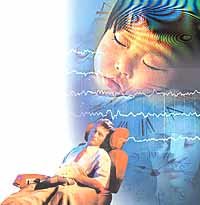How to get a good night`s sleep
How to get a good night`s sleep
Posted March. 09, 2001 18:44,

``How many hours do you sleep on weekdays?`` ``Do you sleep longer on weekends?`` ``Do you tend to fall asleep quickly?`` ``Do you find it hard to get up without an alarm?`` If you sleep for more than eight hours a day, even on weekends; fall asleep right away but never get up without an alarm, you may have a chronic sleep shortage. Here are some pieces of advice to help you sleep soundly.
Be happy:
Mental stress is one of the things that prevent people from sleeping soundly. Make sure that you take a few minutes every day to tranquilize your mind and try to think positively. Enjoying sports and hobbies and spending time with friends and family are good ways of overcoming stress.
To make yourself feel relaxed, first sit down in a comfortable posture, close your eyes and talk to yourself while breathing through your nose. Do this for 10 to 20 minutes and then stay put with your eyes closed and for a few minutes longer. Then, get up slowly. It is best to do this some two hours after a meal because the digestive process can hamper relaxation.
Avoid greasy food:
To sleep well, you should have a well-balanced diet. Eat balanced meals containing essential nutrients; eat a lot at lunch and lightly at dinner. Protein-rich foods such as fish are good at dinner but avoid eating greasy foods within four to five hours before going to bed.
Stretching helps:
Sleeping disorders tend to ease if you work out regularly. Exercise in the morning does not affect your ability to sleep. The best time to work out is around noon or late in the afternoon. Only you should avoid doing exercise within three hours before going to bed. Exercise expedites the secretion of adrenaline and hampers sleep.
Stretching is helpful when you are trying to promote sound sleep. Relax and rotate your head to the left and right.
Other methods:
Taking a warm bath (up to 38 degrees Celsius) just before going to bed is good for you. But if you have health problems such as hypertension, heart trouble or pregnancy, consult a doctor first. Avoid smoking and drinking caffeinated beverages within six hours before going to bed. Having small amounts of wine before or during meals is not bad for you but avoid doing it three hours before going to bed.







